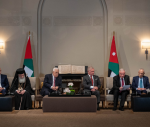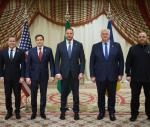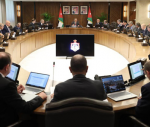You are here
A lesson I learned about elections
Nov 04,2024 - Last updated at Nov 04,2024
This presidential contest has been intensely debated within the Arab American community. In a normal election year, I would be out urging my community to vote for Democrats to stop Donald Trump from re-entering the White House. I would remind them of his racism, xenophobia and anti-Muslim, anti-immigrant rhetoric, and the danger he poses to women’s rights, civil rights and civil liberties, the environment, workplace protections, health care, academic freedom, civil discourse, and the Constitution. But this is not a normal election.
My community has been deeply traumatised by the genocide in Gaza and now the devastating war on Lebanon. They are justifiably furious at the Biden administration’s refusal to enforce US laws and rein in Israel’s unconscionable and illegal actions, enabling Israel’s impunity.
We have seen a significant decline in Arab American support for Democrats, an uptick in GOP support, and many turning to third-party candidates to punish Democrats. I, too, feel this pain and am torn as to how to move forward. I wish it were different, but it just is not.
However, I have questions for those who rightly hold this Democratic administration responsible for genocide and want to punish the Democratic presidential nominee. How will punishing Vice-President Harris and enabling Donald Trump’s victory end the genocide, especially when our allies among progressive Democrats, who have been advancing our foreign and domestic policy concerns, will pressure a Harris White House with us? Meanwhile, Trump’s party is dominated by hardline hawks with little or no concern for Palestinians or our civil rights. How will voting for parties that have struggled for decades for even 1 per cent of the vote advance anything other than helping elect Trump? How does turning our backs on our allies in the struggles for civil and political rights and a just foreign policy amount to “voting one’s conscience”?
I’m reminded of a lesson I learned from the late Julian Bond after the 1968 election. A decade ago, I wrote a reflection on that lesson. I ask you to consider it again:
***
In 1968, the US was reeling from the Vietnam War, urban unrest, and the assassinations of Martin Luther King and Senator Robert Kennedy. Voter opposition to the war forced President Lyndon Johnson to end his reelection bid in favor of his Vice President Hubert Humphrey.
On the Democratic convention’s first night, a fight erupted over recognizing the all-white Georgia delegation or the racially diverse delegation led by a young civil rights leader, Julian Bond. The mixed delegation won a partial victory. The second night Bond helped lead an (ultimately failed) effort to amend the platform to oppose the continuation of the war.
The third night, anti-war delegates proposed Bond instead of the party leaders’ hand-picked choice, Senator Ed Muskie, as vice-presidential nominee. Unable to silence the anti-war opposition, party leaders brought in police who were televised beating delegates chanting Bond’s name.
On the final day, after Humphrey and Muskie accepted their nominations, Julian Bond came on stage and in a show of unity held up Humphrey’s and Muskie’s hands. Many young activists, like myself, were devastated.
A few years later, I got to know Julian Bond and asked why he did that. He responded that there were two types of people: those who looked at the evils of the world and said, “I’m going to stand on my principles because it’s got to get a lot worse before it gets better” and those who say, “I’ve got to get to work to see if I can make it at least a little bit better.”
“I’m with the second group because taking the first view allows too many people to continue to suffer while I maintained my purity and refused to do anything to help. At the convention, it was not Bond versus Muskie. It was Humphrey versus Nixon. I had to make a choice about who would help make life at least a little bit better.”
I never forgot that lesson and am challenged daily to apply it. It is why I have so little patience for ideologues from the right or the left who miss the muck of our lived reality and the tough choices we face to make life a little bit better, in the struggle for human rights, improving quality of life, or providing security for those who are most vulnerable.
The writer is president of the Washington-based Arab American Institute














Add new comment